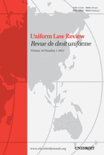
Uniform Law Review
Scope & Guideline
Unraveling the Threads of Uniform Law for a Global Audience
Introduction
Aims and Scopes
- International Commercial Contracts:
The journal emphasizes the development and interpretation of international commercial contracts, including the application of the UNIDROIT Principles and the CISG, addressing fundamental issues such as breach, performance, and contractual obligations. - Comparative Law:
A core area of focus is the comparative analysis of legal systems, particularly how different jurisdictions implement and adapt international legal standards, including the implications for local laws in regions such as Latin America, Asia, and Africa. - Emerging Technologies and Legal Frameworks:
The journal explores the intersection of emerging technologies—such as AI, blockchain, and digital assets—with commercial law, examining the need for new legal frameworks to address challenges posed by these innovations. - Sustainable Development in Law:
Sustainability is increasingly featured, with discussions on integrating sustainable development clauses in contracts and the role of international law in promoting environmental considerations in commercial transactions. - Dispute Resolution Mechanisms:
The journal addresses various aspects of dispute resolution in international trade, including arbitration, jurisdictional issues, and the role of alternative dispute resolution mechanisms, particularly within the context of OHADA and other regional frameworks. - Secured Transactions Law:
A significant focus area involves the reform and harmonization of secured transactions law, with discussions on global standards and their implementation in various jurisdictions.
Trending and Emerging
- Digital Transformation in Law:
There is a marked increase in discussions around digital transformation, particularly the legal implications of blockchain technology, smart contracts, and electronic records, highlighting the need for legal frameworks that can accommodate these innovations. - Sustainability and Environmental Law:
The rise of sustainability as a key legal theme is evident, with more papers focusing on the integration of environmental considerations in international contracts and the role of law in promoting sustainable business practices. - AI and Legal Compliance:
The intersection of artificial intelligence and legal compliance is gaining traction, with discussions exploring the implications of AI on corporate governance and contract formation, reflecting the need for legal clarity in this rapidly evolving area. - Transnational Law and Hybrid Adjudication:
There is an emerging focus on transnational law as it pertains to hybrid adjudication methods, showcasing a growing interest in how private entities can navigate international disputes. - Crypto-assets and Financial Regulation:
The increasing prominence of crypto-assets and their regulatory implications is a significant emerging theme, with discussions on uniform laws for crypto-assets and their integration into existing financial systems.
Declining or Waning
- Traditional Contract Law:
There has been a decrease in publications centered on traditional contract law principles without the integration of contemporary issues, such as digitalization and global commerce, indicating a shift towards more modern interpretations. - Regional Legal Frameworks in Isolation:
While comparative law remains a strong focus, papers that solely examine regional legal frameworks without connecting them to broader international standards or trends have become less frequent. - General Discussions on OHADA Law:
Although OHADA law has been a significant component of the journal, the number of papers dedicated to its general principles without specific applications or case studies has declined, suggesting a move towards more practical and comparative analyses. - Theoretical Perspectives on Law:
There appears to be a waning interest in purely theoretical discussions of law, with a preference for papers that offer practical solutions or case studies relevant to current legal challenges. - Focus on Historical Perspectives:
There is less emphasis on historical analyses of commercial law, as the journal increasingly prioritizes contemporary issues and future-oriented discussions.
Similar Journals
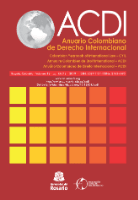
Anuario Colombiano de Derecho Internacional-ACDI
Bridging Borders with Rigorous Legal InsightsAnuario Colombiano de Derecho Internacional-ACDI, published by UNIV ROSARIO, EDITORIAL, is a pivotal open-access journal established in 2008, focusing on the field of international law. Situated in Colombia, this journal serves as a vital platform for scholars, practitioners, and students to disseminate and discuss pivotal legal issues that resonate within an increasingly globalized context. With an impact factor reflecting its relevance—ranking in the Q3 category of law and positioned at the 33rd percentile among legal journals in the Scopus ranking—ACDI is a commendable source for academic research. The journal operates under a rigorous peer-review process, ensuring high standards of scholarly communication. Its commitment to accessibility fosters a broader dialogue among legal professionals worldwide, making it an essential resource for advancing knowledge and discourse in international law.
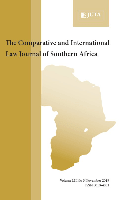
Comparative and International Law Journal of Southern Africa-CILSA
Unveiling Critical Legal Insights for a Changing WorldComparative and International Law Journal of Southern Africa (CILSA) is a prestigious academic publication dedicated to advancing the understanding of comparative and international law within the Southern African context. Published by the University of South Africa, Institute of Foreign & Comparative Law, CILSA serves as a critical platform for scholars, practitioners, and students to explore significant legal issues and developments that impact the region and beyond. The journal's ISSN is 0010-4051, ensuring its visibility and accessibility within academic circles. While CILSA currently operates under a traditional publishing model, it remains committed to providing high-quality, peer-reviewed research that addresses pressing legal challenges and promotes informed discourse. With a mission to bridge the gap between different legal systems and encourage comparative analysis, CILSA is essential reading for anyone invested in the evolution of law in a globalized world.

VIRGINIA LAW REVIEW
Engaging Minds, Influencing PoliciesVIRGINIA LAW REVIEW is a preeminent legal journal published by the University of Virginia Law Review Association, recognized for its rigorous scholarship and intellectual discourse in the field of law. With an ISSN of 0042-6601, this journal has maintained a prominent position in academia, reflected in its Q1 category ranking in law and a Scopus ranking of #167 out of 1025, placing it in the top 17% of its field. Drawing upon a rich tradition dating back to its inception in 1967 and covering a broad spectrum from legal theory to practical applications, the Virginia Law Review aims to foster innovative legal thought and engage both scholars and practitioners. While it does not currently operate under an open access model, its contributions to scholarly research are invaluable, providing insights that significantly influence legal practices and policies. Situated in Charlottesville, Virginia, at 580 Massie Road, this esteemed publication appeals to researchers, legal professionals, and students alike, making it an essential resource for anyone eager to delve into the complexities of contemporary legal issues.

AMERICAN BANKRUPTCY LAW JOURNAL
Shaping the discourse on bankruptcy legislation and case law.American Bankruptcy Law Journal is a pivotal resource in the field of bankruptcy law, published by the National Conference of Bankruptcy Judges. With a rich history of scholarly contributions since 1996, this journal aims to provide comprehensive analysis and examination of bankruptcy legislation, policy implications, and case law developments. The journal is indexed within Scopus, where it holds an impressive ranking of #288 out of 722 in the Social Sciences - Law category, reflecting its impact and relevance in the legal community. Although it operates under a traditional subscription model without Open Access options, its contributions are invaluable for legal scholars, practitioners, and students seeking to navigate the complexities of bankruptcy issues. By fostering discussions and disseminating research, the American Bankruptcy Law Journal remains an essential platform for driving forward important conversations in this critical area of law.
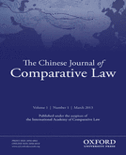
Chinese Journal of Comparative Law
Navigating the Complexities of Comparative LawWelcome to the Chinese Journal of Comparative Law, a premier academic journal dedicated to the field of comparative law, published by Oxford University Press. Since its inception in 2013, the journal has provided a crucial platform for scholars and practitioners to engage with the intricacies of legal principles across different jurisdictions, emphasizing both traditional and contemporary issues relevant to the field. With an impact factor reflecting its influence—ranked Q2 in Law and Q3 in Economics and Econometrics—the journal continues to foster innovative research and dialogue among legal professionals. The Scopus rank positions it well within the top 69th percentile of law journals, illustrating its significant contribution to the social sciences. While not open access, the journal's commitment to disseminating high-quality, peer-reviewed research ensures it remains an essential resource for researchers, practitioners, and students interested in the evolving landscape of comparative law. As the journal converges through 2024, it invites contributions that not only challenge existing paradigms but also enhance the understanding of law in a global context.
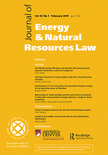
Journal of Energy & Natural Resources Law
Empowering Legal Insights for Sustainable Energy FuturesJournal of Energy & Natural Resources Law, published by Taylor & Francis Ltd, stands as a pivotal source for the examination and discussion of legal issues related to energy and natural resources. With an ISSN of 0264-6811 and an E-ISSN of 2376-4538, this esteemed journal has garnered attention in both the legal and energy sectors, boasting notable rankings with a Q3 category in Energy (Miscellaneous) and a Q1 in Law for 2023. The journal serves as a critical platform for researchers, professionals, and students, offering peer-reviewed articles that delve into contemporary legal frameworks, regulatory evolutions, and policy developments affecting natural resources and energy industries. Additionally, its impressive Scopus rankings, placing it in the 91st percentile for Social Sciences - Law and the 50th percentile for Energy, underline its commitment to high-quality research and its contribution to the discourse surrounding sustainable energy practices and legal innovations. The journal aims to foster dialogue and collaboration among experts in these dynamic fields, making it an essential resource for those engaged in energy law and natural resource management.

Revista e-Mercatoria
Navigating the Intricacies of Market BehaviorRevista e-Mercatoria is a distinguished academic journal published by UNIV EXTERNADO COLOMBIA, dedicated to the comprehensive field of commerce and economic studies. With its ISSN 1692-3960, this journal serves as a vital platform for researchers, professionals, and students seeking to explore the dynamic intricacies of market behavior, economic strategies, and commerce innovations. Though currently not indexed as open access, it upholds a commitment to disseminating high-quality research that contributes to theoretical and practical advancements in commerce. By fostering scholarly discussions and publishing original research, Revista e-Mercatoria plays an essential role in enhancing knowledge and understanding in the realm of economics and trading practices, supporting the academic and professional development of its diverse readership.

Vestnik Permskogo Universiteta-Juridicheskie Nauki
Unlocking Insights in Jurisprudence and LawVestnik Permskogo Universiteta-Juridicheskie Nauki, published by the Perm State National Research University, serves as a prominent platform for the dissemination of legal scholarship since its inception. With an Open Access policy implemented in 2009, this journal offers a wide range of legal studies, including comparative law, constitutional law, and international law, making it an essential resource for researchers, academics, and practitioners in the field. Although it is a relatively young publication, its commitment to quality and accessibility has established it as a respected voice in jurisprudence, contributing significantly to both national and international legal discourse. Researchers and students alike will find valuable insights within its pages, encompassing the latest developments and theoretical advancements within Russian and global legal systems. For those looking to stay informed on current legal issues and academic debates, this journal is a must-read.
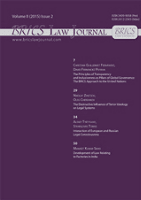
BRICS Law Journal
Unveiling Insights into BRICS Legal FrameworksBRICS Law Journal is a prominent peer-reviewed publication dedicated to the exploration and critical analysis of legal issues pertinent to the BRICS nations—Brazil, Russia, India, China, and South Africa. Published by LLC V EM PUBLISHING HOUSE, this journal has established itself as an essential resource since its inception in 2014, offering Open Access to foster global research dissemination and collaboration. With an impact factor that reflects its academic rigor, the journal has achieved a commendable Q2 ranking in the field of Law as per the 2023 category quartiles. It is indexed in Scopus, where it holds a rank of #615/1025 in Social Sciences—Law, showcasing its relevance and influence within the legal scholarly community. The BRICS Law Journal aims to address contemporary legal challenges and policy developments in the region, making it a vital resource for researchers, practitioners, and students seeking to engage with the evolving legal landscape and contribute to the discussions that shape the future of law in these diverse nations.

Revista Boliviana de Derecho
Navigating the Evolution of Law in BoliviaRevista Boliviana de Derecho is a prominent academic journal dedicated to the exploration and dissemination of legal studies, particularly focusing on the issues pertinent to Bolivia and Latin America. Published by Inst Derecho Iberoamericano, this journal serves as a vital platform for researchers, legal professionals, and students to engage with contemporary legal theories and practices. With its ISSN 2070-8157 and E-ISSN 2706-8080, the journal adheres to high academic standards and aims to contribute significantly to the advancement of legal scholarship in the Spanish-speaking world. Although it operates within a closed access framework, its publications are crucial for understanding the evolution of legal frameworks and their implications in a rapidly changing society. By providing a convergence of diverse legal opinions and analyses, Revista Boliviana de Derecho remains an essential resource for anyone invested in the field of law.